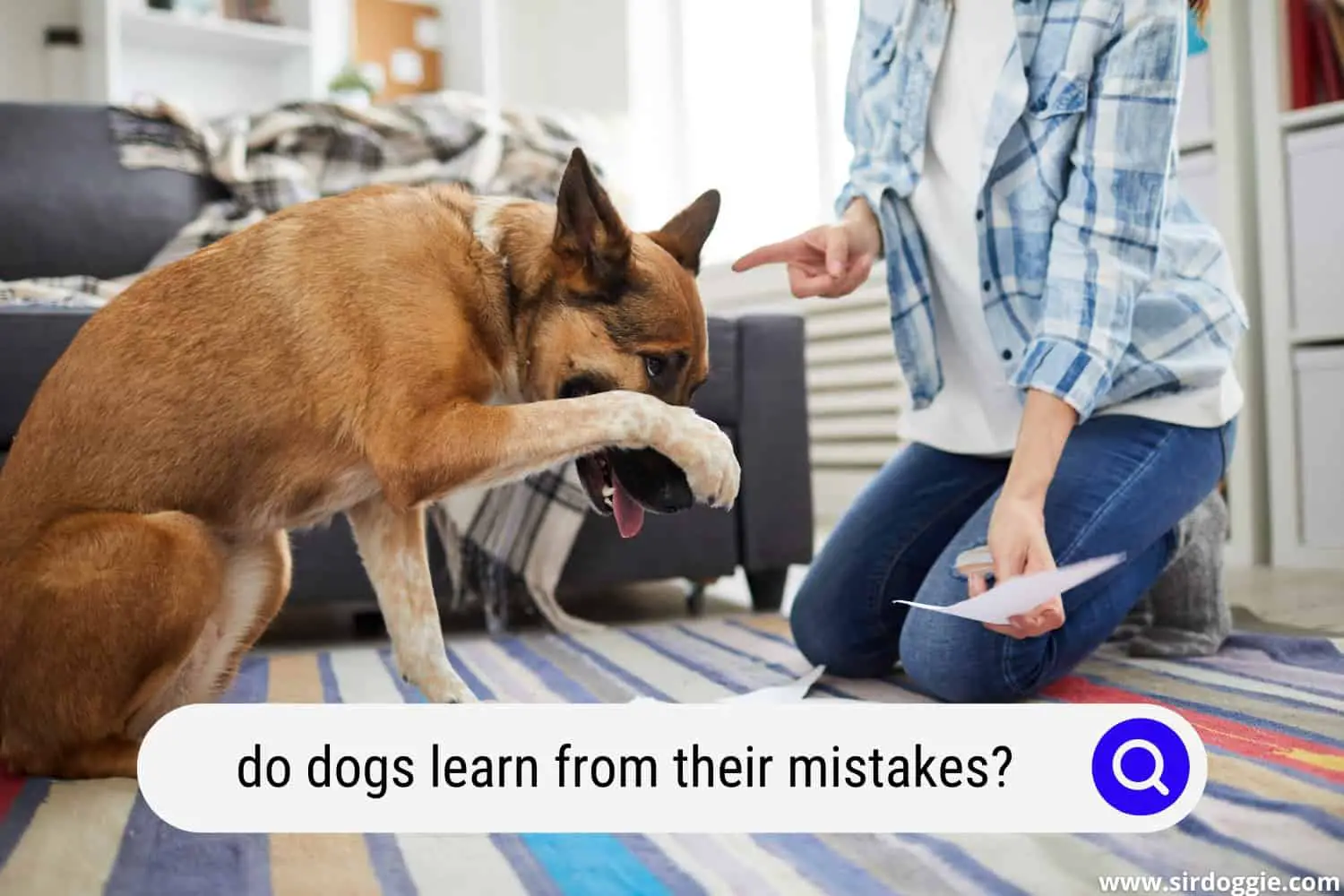Do Dogs Learn from Their Mistakes? (Explained)
When training dogs and raising them from puppies, you want them to do good and try to show encouragement every step of the way. The dog is excellent at learning and is becoming better at obeying your commands. But, as precious as the puppy is, it still keeps making mistakes.
Many owners feel this way and often wonder if their dog will learn from its mistakes. The answer is no, dogs don’t make mistakes. The only creature making an error is the human involved with the training. Remember, to err is human and a dog obeys.

Can a dog learn from its mistakes?
This means that if your dog isn’t doing what you command, you aren’t training the dog right. Dogs live to please their owners and will do whatever they want so long as they understand what that is. More complicated tasks and duties require more training, patience, and a slow progression from one step to the next.
Why do people believe dogs make mistakes?
We tend to anthropomorphize our canines to a human way of thinking. But dogs don’t make decisions or make rational assumptions in the same way people can. This is why humans are vulnerable to error, we make choices freely and act on our ideas and inclinations independently. Dogs don’t do this.
That said, they do get distracted, watch, observe, play, and contemplate. All of which encompass a sort of independent way of thinking. But, when trained for specific tasks, they make decisions based on what they know their owners want.
This is because dogs look for reward and assurance more than they rely on their thoughts which equate to individual behavior. So, they will behave in ways that get your attention based on your cues.
What are the most common mistakes people make when training their dogs?
Since the fault of mistakes lies on the shoulders of the owner, it’s better to understand how people can learn from their errors rather than expecting it from the dog. The following are some of the most common mistakes people make when training their dogs:
- Procrastination: Whether your dog is a family pet or a champion weight puller, begin training the moment you bring it home. The dog’s age doesn’t matter, puppy or adult. Younger dogs need time to learn more advanced directions but house training and basic commands are imperative.
- Irregular Training: Training sessions with your dog should be regular, frequent, and consistent throughout its life. Even if your dog masters what you intend for it, continue to have training sessions at least two to three times per week. Find new things to teach your dog and sometimes revisit older lessons.
- Arrogance: Unfortunately, many owners think they’re dog-training experts after reading one website. Learning to train your dog is as much of a process for you as it is for your dog. It’s best to read several sources of information while seeking out other owners and trainers for tips, tricks, experiences, and suggestions.
- Disproportionate Training: You must steadily be persistent with commands whether you are training or not. Inconsistency confuses dogs and it can end up reinforcing undesirable behaviors. If you train your dog not to beg for food, don’t ever give in to the dog.
- Lack of Real-Life Application: Teaching your dog its newfound skills in different settings and with various people is essential. Also known as proofing the behavior, it is not enough that your dog learns a task in sessions with you or a trainer. It also needs practice with new people and situations so it knows how to handle varying circumstances.
- Hastiness: Some people tend to be impatient with their dogs and lack consideration for the dog’s pace of learning. Dogs do pick up on the feelings and emotions of their owners, an expression of annoyance or stress will only make matters worse.
- Severe Reprimands: Dogs do not respond to harsh physical punishment, intense yelling, cruel staring, grabbing, jerking, or some other negative reaction. The only thing your dog will learn is to fear you and this can lead to dangerous aggressive behavior that will put you and others at risk.
- Behavior Reinforcement: The timing and instance of your reward will determine how the dog behaves and what it learns. Rewarding the dog for a job well done requires immediacy. If you wait, the dog will associate the reward with a different behavior. The same goes for correcting undesirable behavior.
- Ignoring the Dog: Not paying attention can be useful when curbing a dog from things like excessive barking, begging, whining, etc. But, if the dog is chewing on furniture or some other destructive activity, ignoring the dog is not the right approach.
- Unpleasant Associations: Don’t call your dog when you want to have it do something unpleasant, like taking a bath or nail clipping. They will associate punishment when you call them and this can have adverse effects. Retrieve your dog when doing things you know it won’t like.

Conclusion
Ergo, it’s not the dog who has to learn from its mistakes, it’s the dog’s owner must correct their behavior. Dogs are eager and willing to do whatever we ask of them. They simply need to know exactly what that is and how that behavior will get them the reward they seek: your love, respect, and attention.

Family Dog Expert Author
Hi there! I’m Stuart, a devoted dog lover and family dog expert with over a decade of experience working with our furry companions. My passion for dogs drives me to share my knowledge and expertise, helping families build strong, loving bonds with their four-legged friends. When I’m not writing for SirDoggie, you’ll find me hiking, playing with my beautiful dog, or studying music.